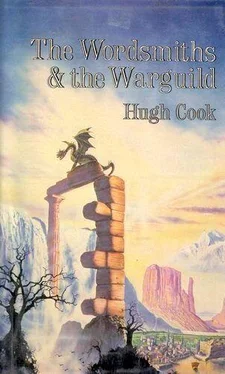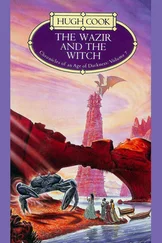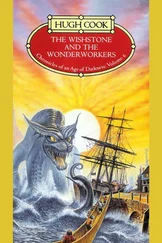Hugh Cook - The Wordsmiths and the Warguild
Здесь есть возможность читать онлайн «Hugh Cook - The Wordsmiths and the Warguild» весь текст электронной книги совершенно бесплатно (целиком полную версию без сокращений). В некоторых случаях можно слушать аудио, скачать через торрент в формате fb2 и присутствует краткое содержание. Жанр: Фэнтези, на английском языке. Описание произведения, (предисловие) а так же отзывы посетителей доступны на портале библиотеки ЛибКат.
- Название:The Wordsmiths and the Warguild
- Автор:
- Жанр:
- Год:неизвестен
- ISBN:нет данных
- Рейтинг книги:4 / 5. Голосов: 1
-
Избранное:Добавить в избранное
- Отзывы:
-
Ваша оценка:
- 80
- 1
- 2
- 3
- 4
- 5
The Wordsmiths and the Warguild: краткое содержание, описание и аннотация
Предлагаем к чтению аннотацию, описание, краткое содержание или предисловие (зависит от того, что написал сам автор книги «The Wordsmiths and the Warguild»). Если вы не нашли необходимую информацию о книге — напишите в комментариях, мы постараемся отыскать её.
The Wordsmiths and the Warguild — читать онлайн бесплатно полную книгу (весь текст) целиком
Ниже представлен текст книги, разбитый по страницам. Система сохранения места последней прочитанной страницы, позволяет с удобством читать онлайн бесплатно книгу «The Wordsmiths and the Warguild», без необходимости каждый раз заново искать на чём Вы остановились. Поставьте закладку, и сможете в любой момент перейти на страницу, на которой закончили чтение.
Интервал:
Закладка:
– And once more.
The light slowly lightened. The sun rose. His blood, pulsing through his ears, sang to him. He felt the steady thud of his heart in his chest. He pushed himself along. Relentlessly. He was a master torturer now, absolutely without pity for the broken organism he was punishing. Brace – push – scrape -
– And rest.
Resting, he heard hoofbeats. They came closer and closer, then the horse wheeled, riding in to halt behind him. Looking up he saw, hazily, a man in the saddle. Togura recognised him by his haircut. He was from the home village.
"Dosh," croaked Togura, pointing north. Then, louder: "Dosh!"
Then he fainted.
Chapter 33
Togura's arrival back at the village was a source of some surprise to the inhabitants. Unbeknownst to him, one of the village men who had survived the fight in the night had come riding back, wounded, to say that the pursuit party had been slaughtered by half a thousand of the enemy. As Togura's return cast doubt on this story, a rescue party was sent north,eventually retrieving the headman from the open plains. Apart from his broken wrists, there was nothing wrong with him but a slipped disc, which was put back into place by skilled manipulation.
As for Togura, his leg was properly splinted. With time, the bone healed, as bones will. The skin he had lost grew back, or was replaced with scar tissue. By the time he was able to walk again, his muscles were badly wasted. He found his tendons had shortened because of his long, idle days in bed without any exercise; his legs were stiff. But the headman, who took a personal interest in his case, showed him, by sign and example – Togura's language skills had not improved – how to build up his strength and regain his flexibility.
Togura foudn that his right leg ached in damp weather. But there was not much damp weather for it to ache in; spring was at an end, and summer had begun.
Soon after he was up and about, there was a big festival, with much eating and drinking. And music making, which he took no part in. He did not sit behind the headman, as he was accustomed to, but beside him, in a place of honour. The next day, all the unmarried women – Namaji this time beign excluded from their ranks – were lined up in front of Togura.
He hesitated.
Someone said something, and all the women laughed. The headman silenced them, then pointed to one of the taller,wider women and gave her an order. To shouts, applause and the stamping of feet, the woman stripped, proudly. She was not what he was looking for, not exactly – she was stronger than he was, and taller – but there was no doubt that she was a real woman. He smiled.
The headman laughed, slapped him on the shoulder, then drew thirteen crescent moons in the dust. He pointed first to the moons, then to Togura, then to the woman.
"A year?" said Togura in dismay.
The woman was already getting dressed again. It seemed he would have to endure his virginity for another year. But he was tough. He would survive.
And life, in the days that followed, was sweeter than it had been.
Togura had a hut of his own now. And a knife, a spear, a bow, arrows, saddles and harness. And a horse, given to him by the headman. He wished he had a stallion which could have challenged the wind. Instead, he had a scrubby little gelding with a hard mouth and an evil disposition; he vowed that as soon as success in battle gave him something better, he would volunteer the gelding for sacrifice.
Early that summer, when Togura had just about finished cataloguing the defects of his present mount, some strangers arrived in the village. They were clean-shaven foreigners in long robes, who brought with them bearded, heavily tattooed tribesmen who acted as interpreters. The strangers spoke at a public meeting; each man of the village then had his say at length. Togura wondered if all this palaver had anything to do with him, but nobody was discussing the life and fate of Togura Poulaan.
What they were talking about was war.
The very next day, all the men began to pack. They were taking all the food,weapons and clothing they could muster, so this was not likely to be a casual overnight raid. Not knowing what the future might hold, Togura packed the magic casket holding his triple-harp, stuffing it down to the bottom of one of his saddlebags. He hated the very sight of it, but knew it would be valuable if they ever reached civilisation.
Once packed, they rode south. A day along their journey, they fell in with another group. To Togura's surprise, those in the other group had their hair knotted in front and tied in three pigtails behind; he recognised them as enemies. But everyone got on very well, singing, joking, laughing, and, in the evening, engaging in friendly wrestling matches. So where were they going? What superior power had made them allies?
As they rode south, the places they passed were more substantial. The villages became little towns. They picked up a track, which became a road. At one of the larger towns, there were negotiations with a blacksmith, after which their unshod horses were shod for the first time in their lives.
At that town, another foreigner in long robes handed out a little bronze coinage to everyone, including Togura; he had to sign for it by inking his thumb then pressing it on a piece of paper against some foreign writing. It was the first piece of paper he had seen for months. He regarded this little ceremony as proof positive of his involvement in a great adventure – and found it increasingly disconcerting not to know where he was going, or why.
They began to travel through farmland under cultivation; the fields of grain by the roadside had been badly damaged by trampling horses, as if a great body of mounted men had passed this way, and had found the road too narrow for their numbers. Those fields which had survived intact were badly in need of weeding, suggesting a labour shortage.
Their journey through cultivated land lasted a day. Late in the afternoon, they surmounted a rise and saw before them the sea, which occasioned many great shouts of amazement. They came to the water's edge in the early evening. Men tasted the water and exclaimed in delight or dismay; much money changed hands. There had obviously been heavy betting on the question of whether the sea was really salty. One man rode his horse right into it, then returned, grinning, and claimed some money from a sceptic who had refused to believe in the existence of such a vast amount of water.
The next morning, they rode into a huge harbourside city. It was larger than Keep, D'Waith and the ruins of Lorford all rolled into one. A foreigner in long robes did a roll call. Togura was delighted to find that his name was on the roll. He was Someone now – he only wished he knew what. A little more money was doled out to each person in turn. They housed their mounts in vast, empty stables; they were shown to a great, gaunt, empty barrack building where they could sleep.
And now what?
Now the men began drifting off in ones or twos; Togura gathered that they had a free day. He wandered off on his own, careful to take good note of his route, so he could find his way back. The city was almost depopulated, the streets filled with sunlight and silence. It stank, but only in a half-hearted way. Togura saw some children, some old women, and a few legless beggars propped up against walls. No whorse accosted him, their bodies hot for his money, though he lived in hope.
Walking down one narrow street, past some buildings which had been looted and burnt out, Togura heard Galish voices. Turning a corner, he saw two Galish merchants in conversation.
"Please, please," he said, running to them.
His voice sounded hoarse, febrile, over-loud. He was in a panic in case these miraculous people suddenly vanished. They did not. But they looked as if they wouldn't mind him vanishing.
Читать дальшеИнтервал:
Закладка:
Похожие книги на «The Wordsmiths and the Warguild»
Представляем Вашему вниманию похожие книги на «The Wordsmiths and the Warguild» списком для выбора. Мы отобрали схожую по названию и смыслу литературу в надежде предоставить читателям больше вариантов отыскать новые, интересные, ещё непрочитанные произведения.
Обсуждение, отзывы о книге «The Wordsmiths and the Warguild» и просто собственные мнения читателей. Оставьте ваши комментарии, напишите, что Вы думаете о произведении, его смысле или главных героях. Укажите что конкретно понравилось, а что нет, и почему Вы так считаете.












